Analysis of IFRS Application in Australia and the United Kingdom
VerifiedAdded on 2022/11/17
|18
|4199
|83
Report
AI Summary
This report provides a detailed analysis of the implementation and application of International Financial Reporting Standards (IFRS) in both Australia and the United Kingdom. It begins with an overview of the conceptual framework of financial reporting, highlighting key aspects such as the goals of financial reporting, qualitative characteristics of financial information, and the definition of assets, liabilities, and equity. The report then explores the reasons behind the adoption of IFRS by both countries, including the benefits of enhanced transparency, global comparability, and improved investor confidence. It also discusses the transitional issues and challenges faced by companies in both Australia and the UK during the adoption process, such as legal issues, structural changes, and unfamiliarity with IFRS principles. The report further examines the specific challenges encountered by reporting entities in each country, including concerns about the complexity of IFRS and the need for professional judgment. Finally, the report concludes with recommendations for national accounting boards regarding the ongoing adoption and refinement of IFRS in both Australia and the United Kingdom.
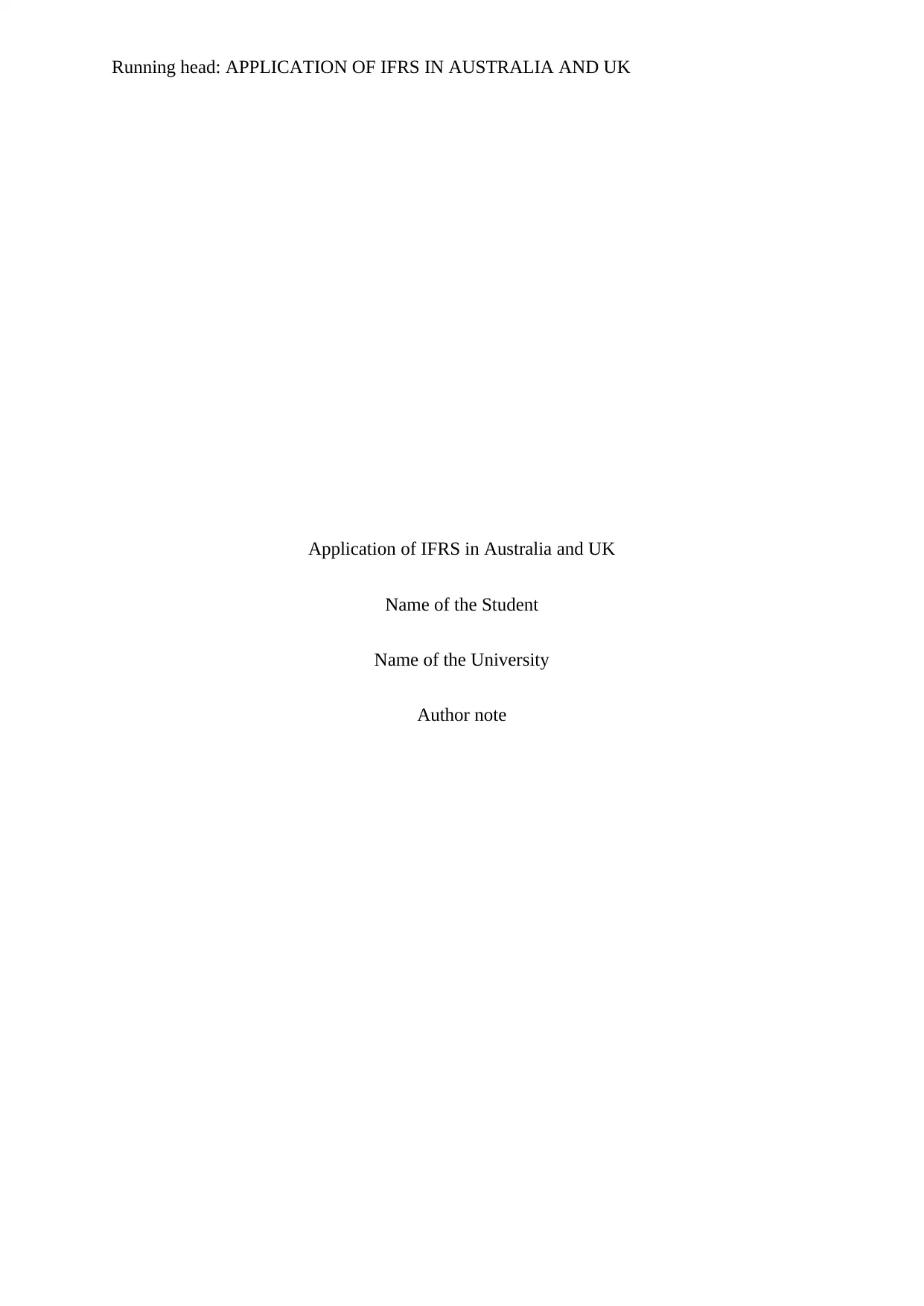
Running head: APPLICATION OF IFRS IN AUSTRALIA AND UK
Application of IFRS in Australia and UK
Name of the Student
Name of the University
Author note
Application of IFRS in Australia and UK
Name of the Student
Name of the University
Author note
Paraphrase This Document
Need a fresh take? Get an instant paraphrase of this document with our AI Paraphraser
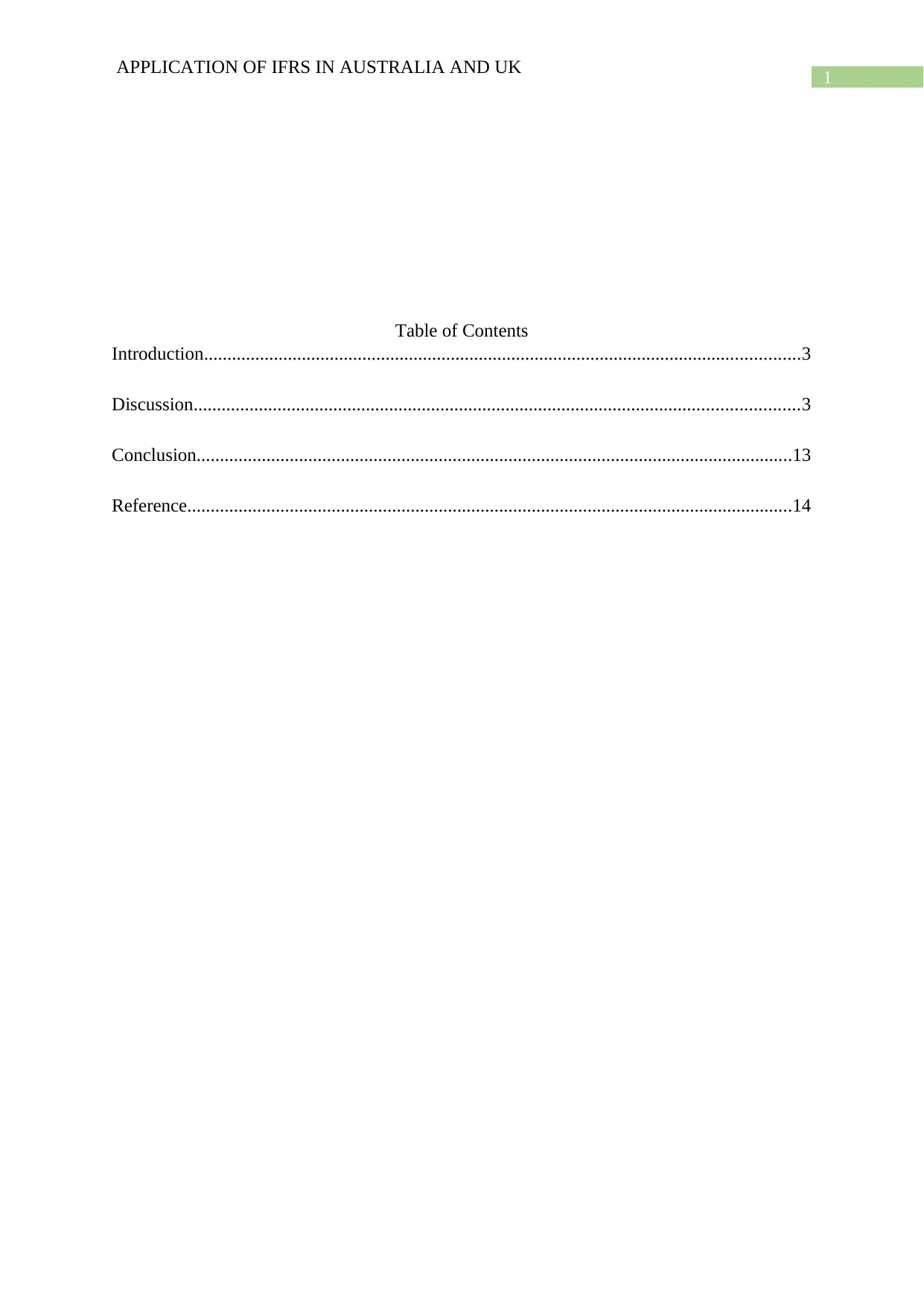
1
APPLICATION OF IFRS IN AUSTRALIA AND UK
Table of Contents
Introduction................................................................................................................................3
Discussion..................................................................................................................................3
Conclusion................................................................................................................................13
Reference..................................................................................................................................14
APPLICATION OF IFRS IN AUSTRALIA AND UK
Table of Contents
Introduction................................................................................................................................3
Discussion..................................................................................................................................3
Conclusion................................................................................................................................13
Reference..................................................................................................................................14
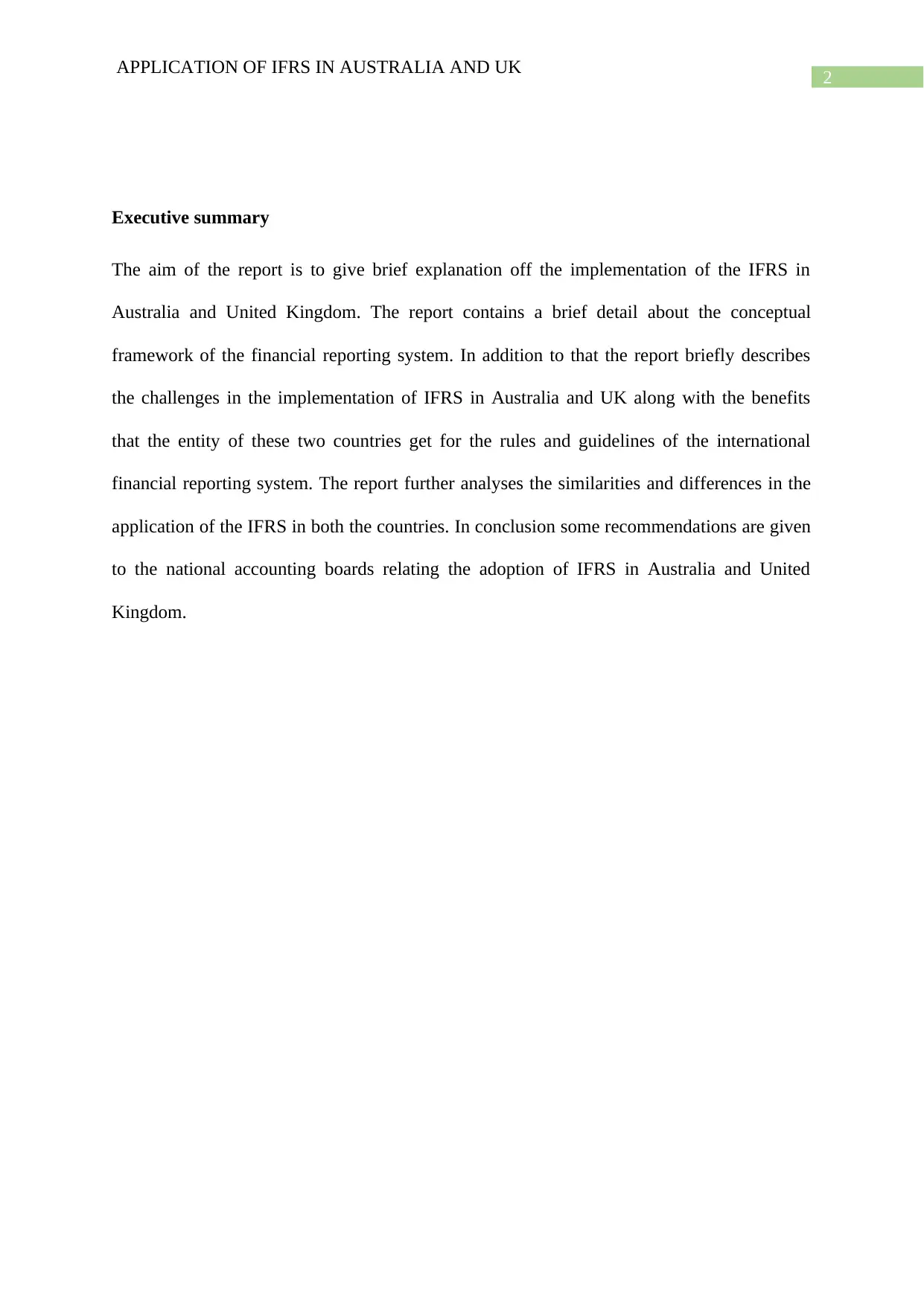
2
APPLICATION OF IFRS IN AUSTRALIA AND UK
Executive summary
The aim of the report is to give brief explanation off the implementation of the IFRS in
Australia and United Kingdom. The report contains a brief detail about the conceptual
framework of the financial reporting system. In addition to that the report briefly describes
the challenges in the implementation of IFRS in Australia and UK along with the benefits
that the entity of these two countries get for the rules and guidelines of the international
financial reporting system. The report further analyses the similarities and differences in the
application of the IFRS in both the countries. In conclusion some recommendations are given
to the national accounting boards relating the adoption of IFRS in Australia and United
Kingdom.
APPLICATION OF IFRS IN AUSTRALIA AND UK
Executive summary
The aim of the report is to give brief explanation off the implementation of the IFRS in
Australia and United Kingdom. The report contains a brief detail about the conceptual
framework of the financial reporting system. In addition to that the report briefly describes
the challenges in the implementation of IFRS in Australia and UK along with the benefits
that the entity of these two countries get for the rules and guidelines of the international
financial reporting system. The report further analyses the similarities and differences in the
application of the IFRS in both the countries. In conclusion some recommendations are given
to the national accounting boards relating the adoption of IFRS in Australia and United
Kingdom.
⊘ This is a preview!⊘
Do you want full access?
Subscribe today to unlock all pages.

Trusted by 1+ million students worldwide
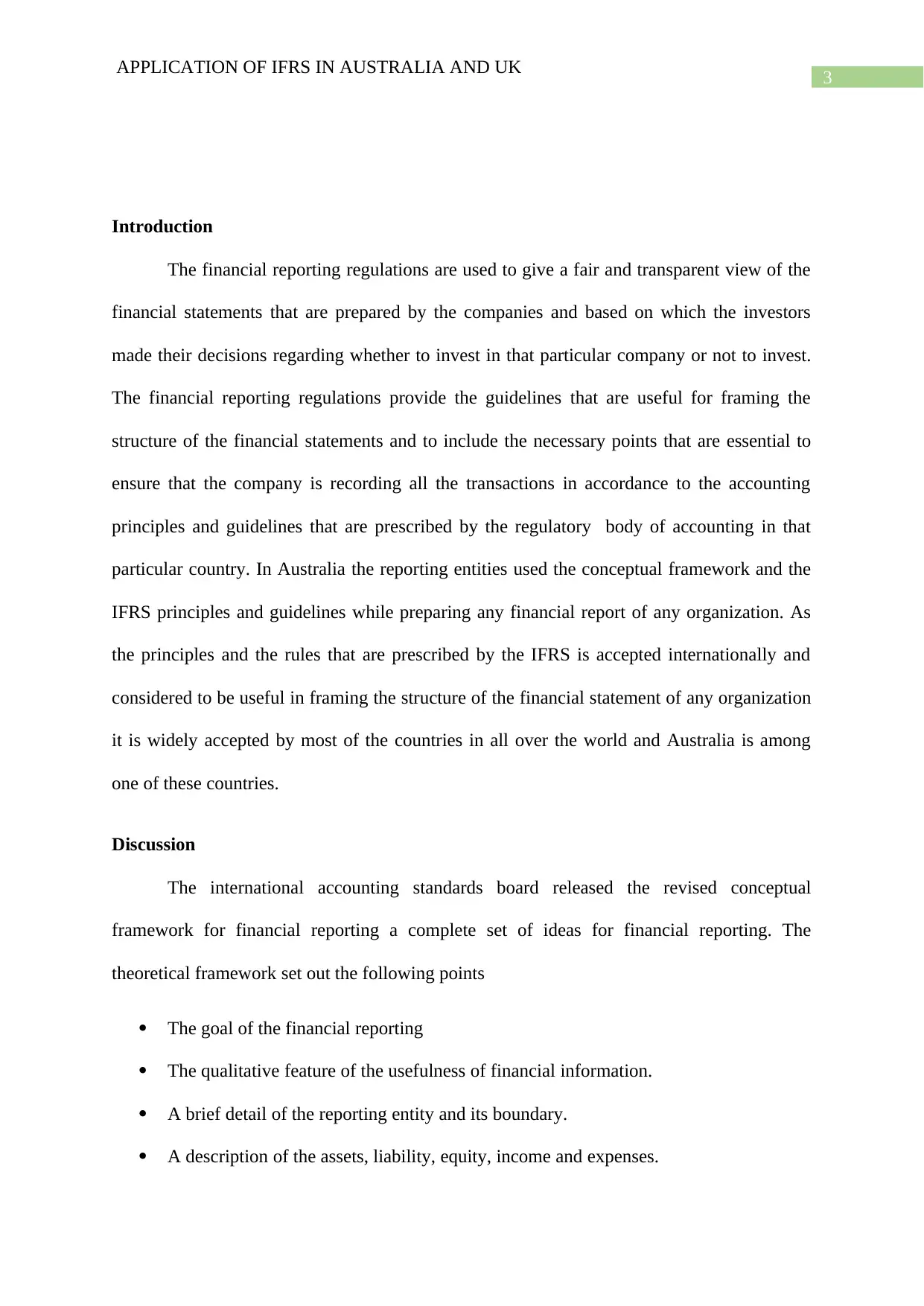
3
APPLICATION OF IFRS IN AUSTRALIA AND UK
Introduction
The financial reporting regulations are used to give a fair and transparent view of the
financial statements that are prepared by the companies and based on which the investors
made their decisions regarding whether to invest in that particular company or not to invest.
The financial reporting regulations provide the guidelines that are useful for framing the
structure of the financial statements and to include the necessary points that are essential to
ensure that the company is recording all the transactions in accordance to the accounting
principles and guidelines that are prescribed by the regulatory body of accounting in that
particular country. In Australia the reporting entities used the conceptual framework and the
IFRS principles and guidelines while preparing any financial report of any organization. As
the principles and the rules that are prescribed by the IFRS is accepted internationally and
considered to be useful in framing the structure of the financial statement of any organization
it is widely accepted by most of the countries in all over the world and Australia is among
one of these countries.
Discussion
The international accounting standards board released the revised conceptual
framework for financial reporting a complete set of ideas for financial reporting. The
theoretical framework set out the following points
The goal of the financial reporting
The qualitative feature of the usefulness of financial information.
A brief detail of the reporting entity and its boundary.
A description of the assets, liability, equity, income and expenses.
APPLICATION OF IFRS IN AUSTRALIA AND UK
Introduction
The financial reporting regulations are used to give a fair and transparent view of the
financial statements that are prepared by the companies and based on which the investors
made their decisions regarding whether to invest in that particular company or not to invest.
The financial reporting regulations provide the guidelines that are useful for framing the
structure of the financial statements and to include the necessary points that are essential to
ensure that the company is recording all the transactions in accordance to the accounting
principles and guidelines that are prescribed by the regulatory body of accounting in that
particular country. In Australia the reporting entities used the conceptual framework and the
IFRS principles and guidelines while preparing any financial report of any organization. As
the principles and the rules that are prescribed by the IFRS is accepted internationally and
considered to be useful in framing the structure of the financial statement of any organization
it is widely accepted by most of the countries in all over the world and Australia is among
one of these countries.
Discussion
The international accounting standards board released the revised conceptual
framework for financial reporting a complete set of ideas for financial reporting. The
theoretical framework set out the following points
The goal of the financial reporting
The qualitative feature of the usefulness of financial information.
A brief detail of the reporting entity and its boundary.
A description of the assets, liability, equity, income and expenses.
Paraphrase This Document
Need a fresh take? Get an instant paraphrase of this document with our AI Paraphraser
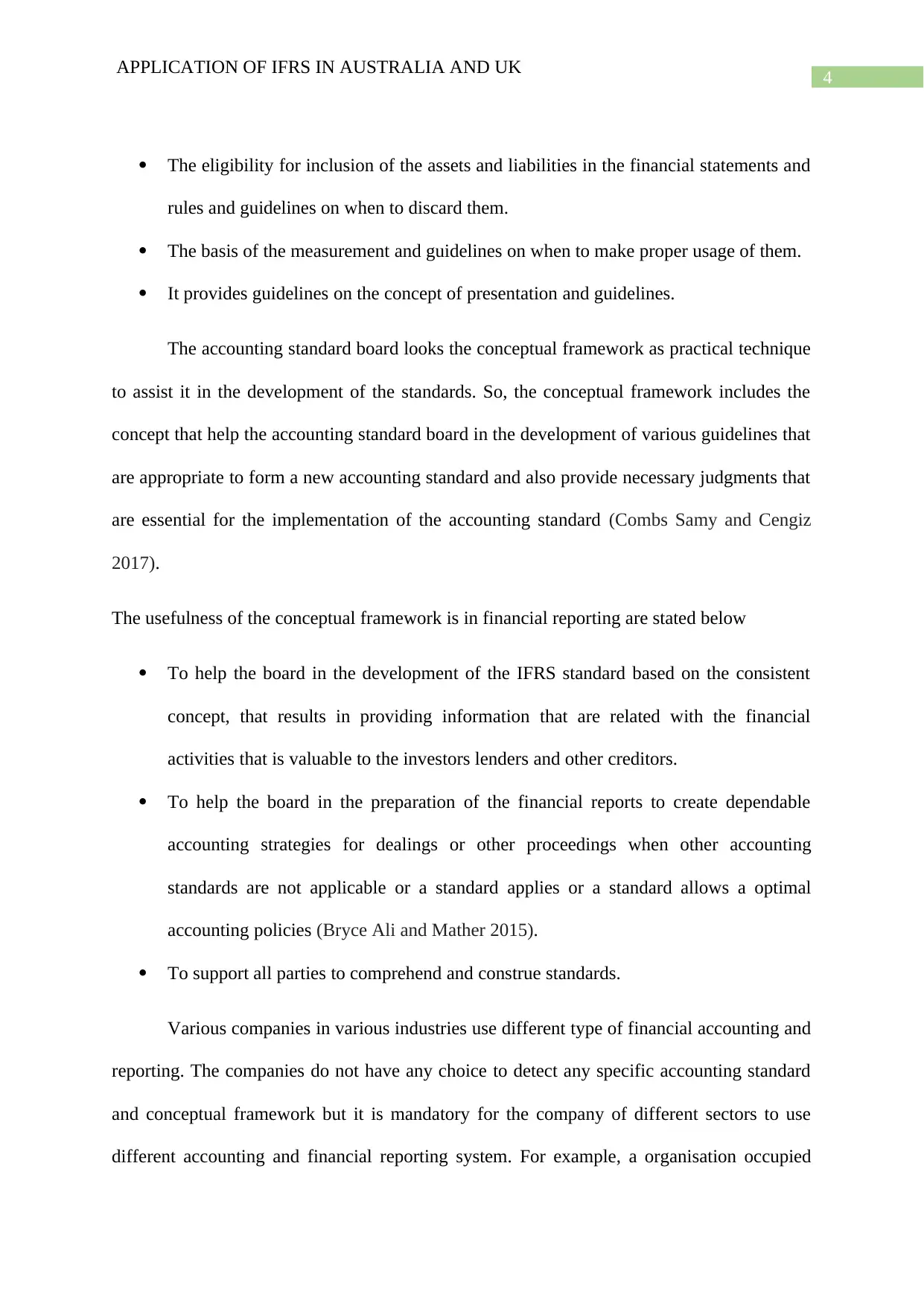
4
APPLICATION OF IFRS IN AUSTRALIA AND UK
The eligibility for inclusion of the assets and liabilities in the financial statements and
rules and guidelines on when to discard them.
The basis of the measurement and guidelines on when to make proper usage of them.
It provides guidelines on the concept of presentation and guidelines.
The accounting standard board looks the conceptual framework as practical technique
to assist it in the development of the standards. So, the conceptual framework includes the
concept that help the accounting standard board in the development of various guidelines that
are appropriate to form a new accounting standard and also provide necessary judgments that
are essential for the implementation of the accounting standard (Combs Samy and Cengiz
2017).
The usefulness of the conceptual framework is in financial reporting are stated below
To help the board in the development of the IFRS standard based on the consistent
concept, that results in providing information that are related with the financial
activities that is valuable to the investors lenders and other creditors.
To help the board in the preparation of the financial reports to create dependable
accounting strategies for dealings or other proceedings when other accounting
standards are not applicable or a standard applies or a standard allows a optimal
accounting policies (Bryce Ali and Mather 2015).
To support all parties to comprehend and construe standards.
Various companies in various industries use different type of financial accounting and
reporting. The companies do not have any choice to detect any specific accounting standard
and conceptual framework but it is mandatory for the company of different sectors to use
different accounting and financial reporting system. For example, a organisation occupied
APPLICATION OF IFRS IN AUSTRALIA AND UK
The eligibility for inclusion of the assets and liabilities in the financial statements and
rules and guidelines on when to discard them.
The basis of the measurement and guidelines on when to make proper usage of them.
It provides guidelines on the concept of presentation and guidelines.
The accounting standard board looks the conceptual framework as practical technique
to assist it in the development of the standards. So, the conceptual framework includes the
concept that help the accounting standard board in the development of various guidelines that
are appropriate to form a new accounting standard and also provide necessary judgments that
are essential for the implementation of the accounting standard (Combs Samy and Cengiz
2017).
The usefulness of the conceptual framework is in financial reporting are stated below
To help the board in the development of the IFRS standard based on the consistent
concept, that results in providing information that are related with the financial
activities that is valuable to the investors lenders and other creditors.
To help the board in the preparation of the financial reports to create dependable
accounting strategies for dealings or other proceedings when other accounting
standards are not applicable or a standard applies or a standard allows a optimal
accounting policies (Bryce Ali and Mather 2015).
To support all parties to comprehend and construe standards.
Various companies in various industries use different type of financial accounting and
reporting. The companies do not have any choice to detect any specific accounting standard
and conceptual framework but it is mandatory for the company of different sectors to use
different accounting and financial reporting system. For example, a organisation occupied
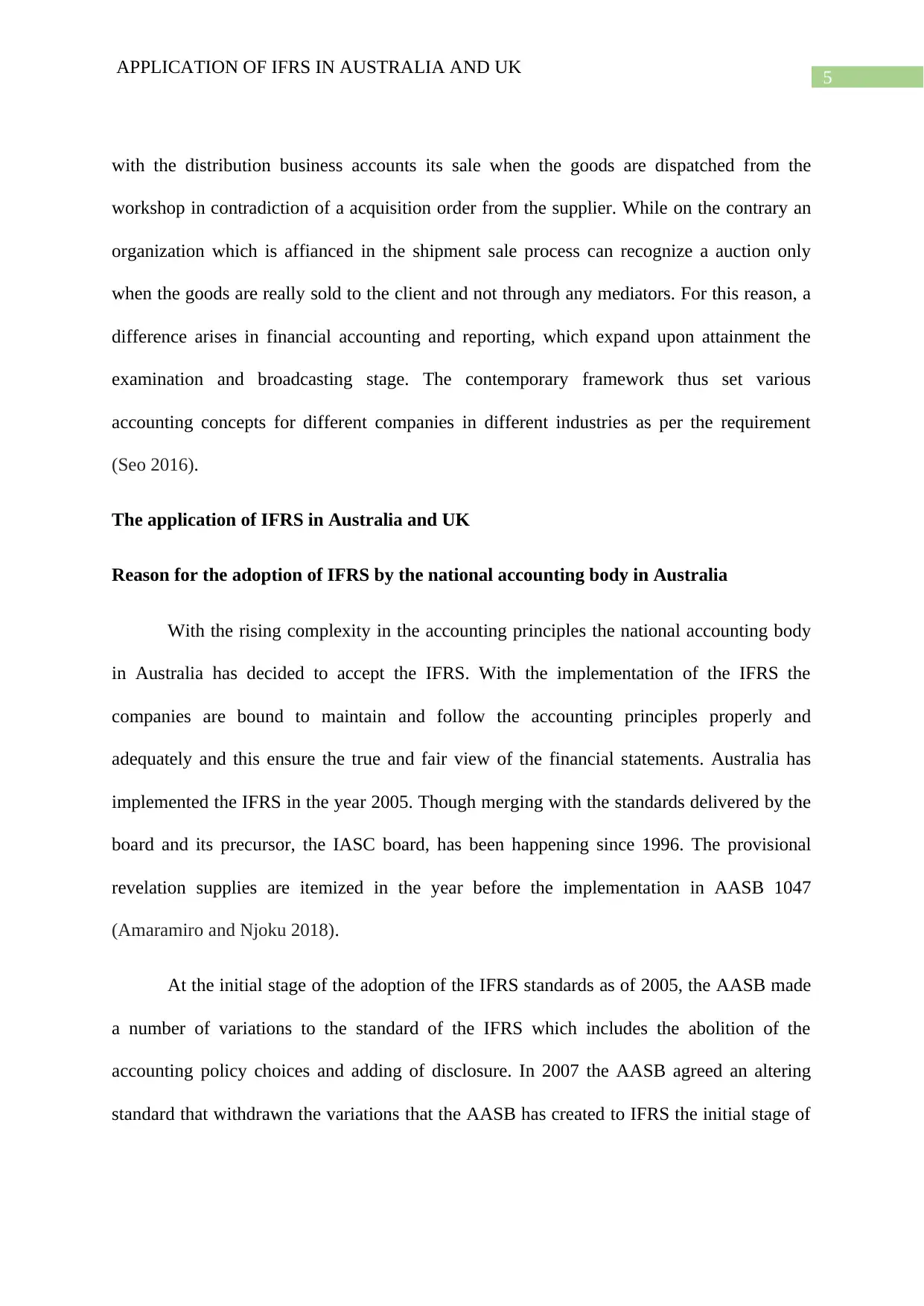
5
APPLICATION OF IFRS IN AUSTRALIA AND UK
with the distribution business accounts its sale when the goods are dispatched from the
workshop in contradiction of a acquisition order from the supplier. While on the contrary an
organization which is affianced in the shipment sale process can recognize a auction only
when the goods are really sold to the client and not through any mediators. For this reason, a
difference arises in financial accounting and reporting, which expand upon attainment the
examination and broadcasting stage. The contemporary framework thus set various
accounting concepts for different companies in different industries as per the requirement
(Seo 2016).
The application of IFRS in Australia and UK
Reason for the adoption of IFRS by the national accounting body in Australia
With the rising complexity in the accounting principles the national accounting body
in Australia has decided to accept the IFRS. With the implementation of the IFRS the
companies are bound to maintain and follow the accounting principles properly and
adequately and this ensure the true and fair view of the financial statements. Australia has
implemented the IFRS in the year 2005. Though merging with the standards delivered by the
board and its precursor, the IASC board, has been happening since 1996. The provisional
revelation supplies are itemized in the year before the implementation in AASB 1047
(Amaramiro and Njoku 2018).
At the initial stage of the adoption of the IFRS standards as of 2005, the AASB made
a number of variations to the standard of the IFRS which includes the abolition of the
accounting policy choices and adding of disclosure. In 2007 the AASB agreed an altering
standard that withdrawn the variations that the AASB has created to IFRS the initial stage of
APPLICATION OF IFRS IN AUSTRALIA AND UK
with the distribution business accounts its sale when the goods are dispatched from the
workshop in contradiction of a acquisition order from the supplier. While on the contrary an
organization which is affianced in the shipment sale process can recognize a auction only
when the goods are really sold to the client and not through any mediators. For this reason, a
difference arises in financial accounting and reporting, which expand upon attainment the
examination and broadcasting stage. The contemporary framework thus set various
accounting concepts for different companies in different industries as per the requirement
(Seo 2016).
The application of IFRS in Australia and UK
Reason for the adoption of IFRS by the national accounting body in Australia
With the rising complexity in the accounting principles the national accounting body
in Australia has decided to accept the IFRS. With the implementation of the IFRS the
companies are bound to maintain and follow the accounting principles properly and
adequately and this ensure the true and fair view of the financial statements. Australia has
implemented the IFRS in the year 2005. Though merging with the standards delivered by the
board and its precursor, the IASC board, has been happening since 1996. The provisional
revelation supplies are itemized in the year before the implementation in AASB 1047
(Amaramiro and Njoku 2018).
At the initial stage of the adoption of the IFRS standards as of 2005, the AASB made
a number of variations to the standard of the IFRS which includes the abolition of the
accounting policy choices and adding of disclosure. In 2007 the AASB agreed an altering
standard that withdrawn the variations that the AASB has created to IFRS the initial stage of
⊘ This is a preview!⊘
Do you want full access?
Subscribe today to unlock all pages.

Trusted by 1+ million students worldwide
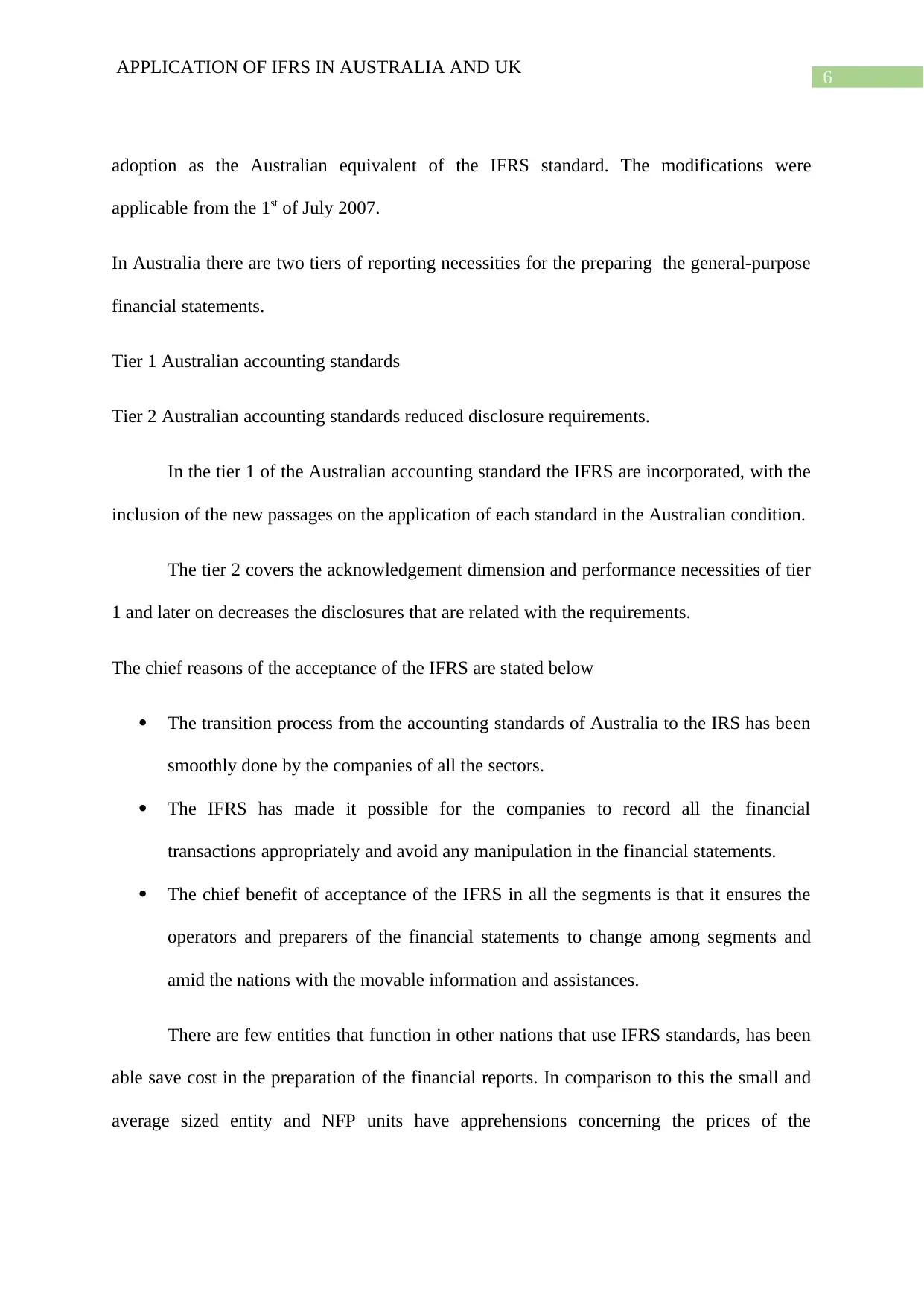
6
APPLICATION OF IFRS IN AUSTRALIA AND UK
adoption as the Australian equivalent of the IFRS standard. The modifications were
applicable from the 1st of July 2007.
In Australia there are two tiers of reporting necessities for the preparing the general-purpose
financial statements.
Tier 1 Australian accounting standards
Tier 2 Australian accounting standards reduced disclosure requirements.
In the tier 1 of the Australian accounting standard the IFRS are incorporated, with the
inclusion of the new passages on the application of each standard in the Australian condition.
The tier 2 covers the acknowledgement dimension and performance necessities of tier
1 and later on decreases the disclosures that are related with the requirements.
The chief reasons of the acceptance of the IFRS are stated below
The transition process from the accounting standards of Australia to the IRS has been
smoothly done by the companies of all the sectors.
The IFRS has made it possible for the companies to record all the financial
transactions appropriately and avoid any manipulation in the financial statements.
The chief benefit of acceptance of the IFRS in all the segments is that it ensures the
operators and preparers of the financial statements to change among segments and
amid the nations with the movable information and assistances.
There are few entities that function in other nations that use IFRS standards, has been
able save cost in the preparation of the financial reports. In comparison to this the small and
average sized entity and NFP units have apprehensions concerning the prices of the
APPLICATION OF IFRS IN AUSTRALIA AND UK
adoption as the Australian equivalent of the IFRS standard. The modifications were
applicable from the 1st of July 2007.
In Australia there are two tiers of reporting necessities for the preparing the general-purpose
financial statements.
Tier 1 Australian accounting standards
Tier 2 Australian accounting standards reduced disclosure requirements.
In the tier 1 of the Australian accounting standard the IFRS are incorporated, with the
inclusion of the new passages on the application of each standard in the Australian condition.
The tier 2 covers the acknowledgement dimension and performance necessities of tier
1 and later on decreases the disclosures that are related with the requirements.
The chief reasons of the acceptance of the IFRS are stated below
The transition process from the accounting standards of Australia to the IRS has been
smoothly done by the companies of all the sectors.
The IFRS has made it possible for the companies to record all the financial
transactions appropriately and avoid any manipulation in the financial statements.
The chief benefit of acceptance of the IFRS in all the segments is that it ensures the
operators and preparers of the financial statements to change among segments and
amid the nations with the movable information and assistances.
There are few entities that function in other nations that use IFRS standards, has been
able save cost in the preparation of the financial reports. In comparison to this the small and
average sized entity and NFP units have apprehensions concerning the prices of the
Paraphrase This Document
Need a fresh take? Get an instant paraphrase of this document with our AI Paraphraser
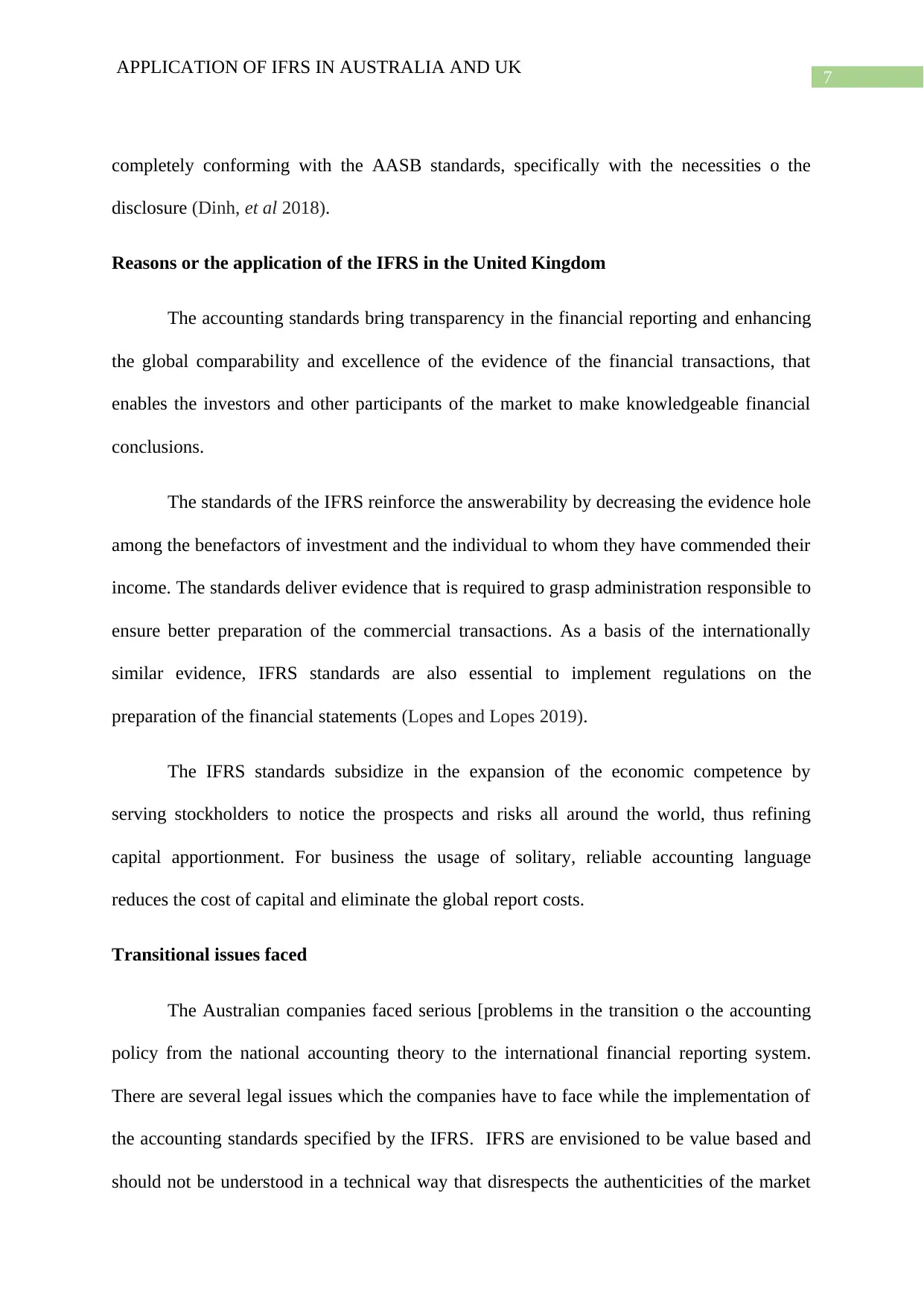
7
APPLICATION OF IFRS IN AUSTRALIA AND UK
completely conforming with the AASB standards, specifically with the necessities o the
disclosure (Dinh, et al 2018).
Reasons or the application of the IFRS in the United Kingdom
The accounting standards bring transparency in the financial reporting and enhancing
the global comparability and excellence of the evidence of the financial transactions, that
enables the investors and other participants of the market to make knowledgeable financial
conclusions.
The standards of the IFRS reinforce the answerability by decreasing the evidence hole
among the benefactors of investment and the individual to whom they have commended their
income. The standards deliver evidence that is required to grasp administration responsible to
ensure better preparation of the commercial transactions. As a basis of the internationally
similar evidence, IFRS standards are also essential to implement regulations on the
preparation of the financial statements (Lopes and Lopes 2019).
The IFRS standards subsidize in the expansion of the economic competence by
serving stockholders to notice the prospects and risks all around the world, thus refining
capital apportionment. For business the usage of solitary, reliable accounting language
reduces the cost of capital and eliminate the global report costs.
Transitional issues faced
The Australian companies faced serious [problems in the transition o the accounting
policy from the national accounting theory to the international financial reporting system.
There are several legal issues which the companies have to face while the implementation of
the accounting standards specified by the IFRS. IFRS are envisioned to be value based and
should not be understood in a technical way that disrespects the authenticities of the market
APPLICATION OF IFRS IN AUSTRALIA AND UK
completely conforming with the AASB standards, specifically with the necessities o the
disclosure (Dinh, et al 2018).
Reasons or the application of the IFRS in the United Kingdom
The accounting standards bring transparency in the financial reporting and enhancing
the global comparability and excellence of the evidence of the financial transactions, that
enables the investors and other participants of the market to make knowledgeable financial
conclusions.
The standards of the IFRS reinforce the answerability by decreasing the evidence hole
among the benefactors of investment and the individual to whom they have commended their
income. The standards deliver evidence that is required to grasp administration responsible to
ensure better preparation of the commercial transactions. As a basis of the internationally
similar evidence, IFRS standards are also essential to implement regulations on the
preparation of the financial statements (Lopes and Lopes 2019).
The IFRS standards subsidize in the expansion of the economic competence by
serving stockholders to notice the prospects and risks all around the world, thus refining
capital apportionment. For business the usage of solitary, reliable accounting language
reduces the cost of capital and eliminate the global report costs.
Transitional issues faced
The Australian companies faced serious [problems in the transition o the accounting
policy from the national accounting theory to the international financial reporting system.
There are several legal issues which the companies have to face while the implementation of
the accounting standards specified by the IFRS. IFRS are envisioned to be value based and
should not be understood in a technical way that disrespects the authenticities of the market
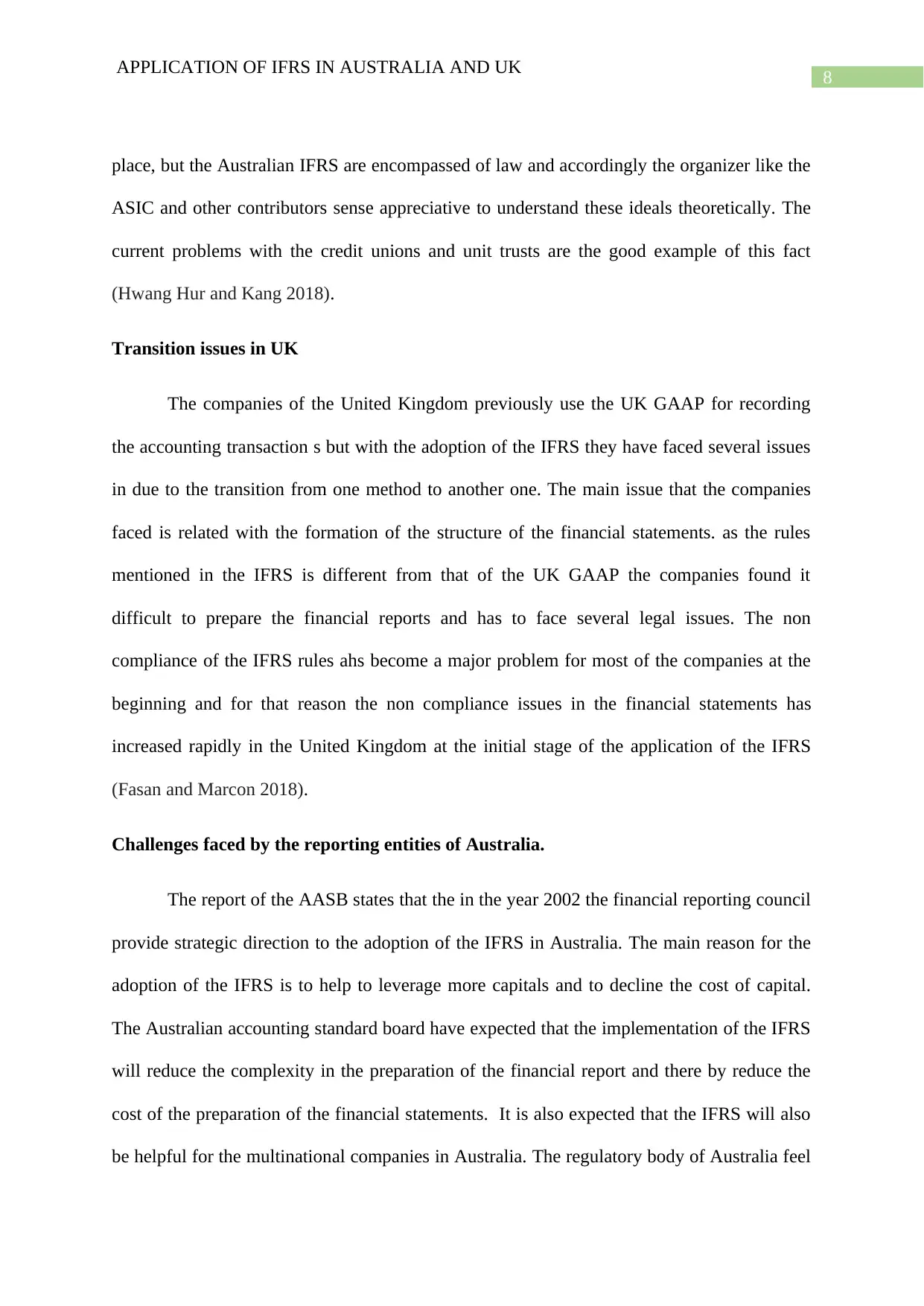
8
APPLICATION OF IFRS IN AUSTRALIA AND UK
place, but the Australian IFRS are encompassed of law and accordingly the organizer like the
ASIC and other contributors sense appreciative to understand these ideals theoretically. The
current problems with the credit unions and unit trusts are the good example of this fact
(Hwang Hur and Kang 2018).
Transition issues in UK
The companies of the United Kingdom previously use the UK GAAP for recording
the accounting transaction s but with the adoption of the IFRS they have faced several issues
in due to the transition from one method to another one. The main issue that the companies
faced is related with the formation of the structure of the financial statements. as the rules
mentioned in the IFRS is different from that of the UK GAAP the companies found it
difficult to prepare the financial reports and has to face several legal issues. The non
compliance of the IFRS rules ahs become a major problem for most of the companies at the
beginning and for that reason the non compliance issues in the financial statements has
increased rapidly in the United Kingdom at the initial stage of the application of the IFRS
(Fasan and Marcon 2018).
Challenges faced by the reporting entities of Australia.
The report of the AASB states that the in the year 2002 the financial reporting council
provide strategic direction to the adoption of the IFRS in Australia. The main reason for the
adoption of the IFRS is to help to leverage more capitals and to decline the cost of capital.
The Australian accounting standard board have expected that the implementation of the IFRS
will reduce the complexity in the preparation of the financial report and there by reduce the
cost of the preparation of the financial statements. It is also expected that the IFRS will also
be helpful for the multinational companies in Australia. The regulatory body of Australia feel
APPLICATION OF IFRS IN AUSTRALIA AND UK
place, but the Australian IFRS are encompassed of law and accordingly the organizer like the
ASIC and other contributors sense appreciative to understand these ideals theoretically. The
current problems with the credit unions and unit trusts are the good example of this fact
(Hwang Hur and Kang 2018).
Transition issues in UK
The companies of the United Kingdom previously use the UK GAAP for recording
the accounting transaction s but with the adoption of the IFRS they have faced several issues
in due to the transition from one method to another one. The main issue that the companies
faced is related with the formation of the structure of the financial statements. as the rules
mentioned in the IFRS is different from that of the UK GAAP the companies found it
difficult to prepare the financial reports and has to face several legal issues. The non
compliance of the IFRS rules ahs become a major problem for most of the companies at the
beginning and for that reason the non compliance issues in the financial statements has
increased rapidly in the United Kingdom at the initial stage of the application of the IFRS
(Fasan and Marcon 2018).
Challenges faced by the reporting entities of Australia.
The report of the AASB states that the in the year 2002 the financial reporting council
provide strategic direction to the adoption of the IFRS in Australia. The main reason for the
adoption of the IFRS is to help to leverage more capitals and to decline the cost of capital.
The Australian accounting standard board have expected that the implementation of the IFRS
will reduce the complexity in the preparation of the financial report and there by reduce the
cost of the preparation of the financial statements. It is also expected that the IFRS will also
be helpful for the multinational companies in Australia. The regulatory body of Australia feel
⊘ This is a preview!⊘
Do you want full access?
Subscribe today to unlock all pages.

Trusted by 1+ million students worldwide
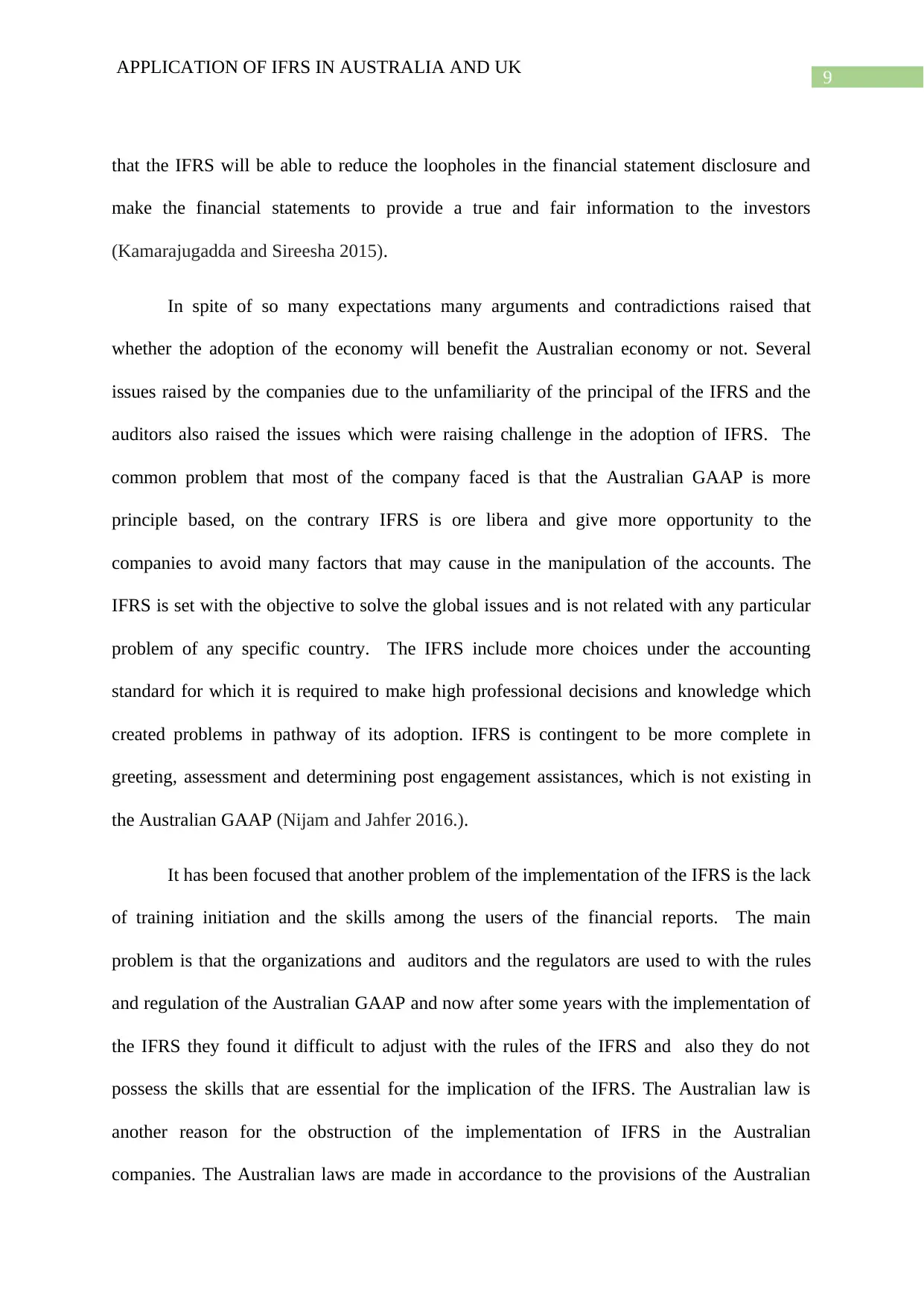
9
APPLICATION OF IFRS IN AUSTRALIA AND UK
that the IFRS will be able to reduce the loopholes in the financial statement disclosure and
make the financial statements to provide a true and fair information to the investors
(Kamarajugadda and Sireesha 2015).
In spite of so many expectations many arguments and contradictions raised that
whether the adoption of the economy will benefit the Australian economy or not. Several
issues raised by the companies due to the unfamiliarity of the principal of the IFRS and the
auditors also raised the issues which were raising challenge in the adoption of IFRS. The
common problem that most of the company faced is that the Australian GAAP is more
principle based, on the contrary IFRS is ore libera and give more opportunity to the
companies to avoid many factors that may cause in the manipulation of the accounts. The
IFRS is set with the objective to solve the global issues and is not related with any particular
problem of any specific country. The IFRS include more choices under the accounting
standard for which it is required to make high professional decisions and knowledge which
created problems in pathway of its adoption. IFRS is contingent to be more complete in
greeting, assessment and determining post engagement assistances, which is not existing in
the Australian GAAP (Nijam and Jahfer 2016.).
It has been focused that another problem of the implementation of the IFRS is the lack
of training initiation and the skills among the users of the financial reports. The main
problem is that the organizations and auditors and the regulators are used to with the rules
and regulation of the Australian GAAP and now after some years with the implementation of
the IFRS they found it difficult to adjust with the rules of the IFRS and also they do not
possess the skills that are essential for the implication of the IFRS. The Australian law is
another reason for the obstruction of the implementation of IFRS in the Australian
companies. The Australian laws are made in accordance to the provisions of the Australian
APPLICATION OF IFRS IN AUSTRALIA AND UK
that the IFRS will be able to reduce the loopholes in the financial statement disclosure and
make the financial statements to provide a true and fair information to the investors
(Kamarajugadda and Sireesha 2015).
In spite of so many expectations many arguments and contradictions raised that
whether the adoption of the economy will benefit the Australian economy or not. Several
issues raised by the companies due to the unfamiliarity of the principal of the IFRS and the
auditors also raised the issues which were raising challenge in the adoption of IFRS. The
common problem that most of the company faced is that the Australian GAAP is more
principle based, on the contrary IFRS is ore libera and give more opportunity to the
companies to avoid many factors that may cause in the manipulation of the accounts. The
IFRS is set with the objective to solve the global issues and is not related with any particular
problem of any specific country. The IFRS include more choices under the accounting
standard for which it is required to make high professional decisions and knowledge which
created problems in pathway of its adoption. IFRS is contingent to be more complete in
greeting, assessment and determining post engagement assistances, which is not existing in
the Australian GAAP (Nijam and Jahfer 2016.).
It has been focused that another problem of the implementation of the IFRS is the lack
of training initiation and the skills among the users of the financial reports. The main
problem is that the organizations and auditors and the regulators are used to with the rules
and regulation of the Australian GAAP and now after some years with the implementation of
the IFRS they found it difficult to adjust with the rules of the IFRS and also they do not
possess the skills that are essential for the implication of the IFRS. The Australian law is
another reason for the obstruction of the implementation of IFRS in the Australian
companies. The Australian laws are made in accordance to the provisions of the Australian
Paraphrase This Document
Need a fresh take? Get an instant paraphrase of this document with our AI Paraphraser
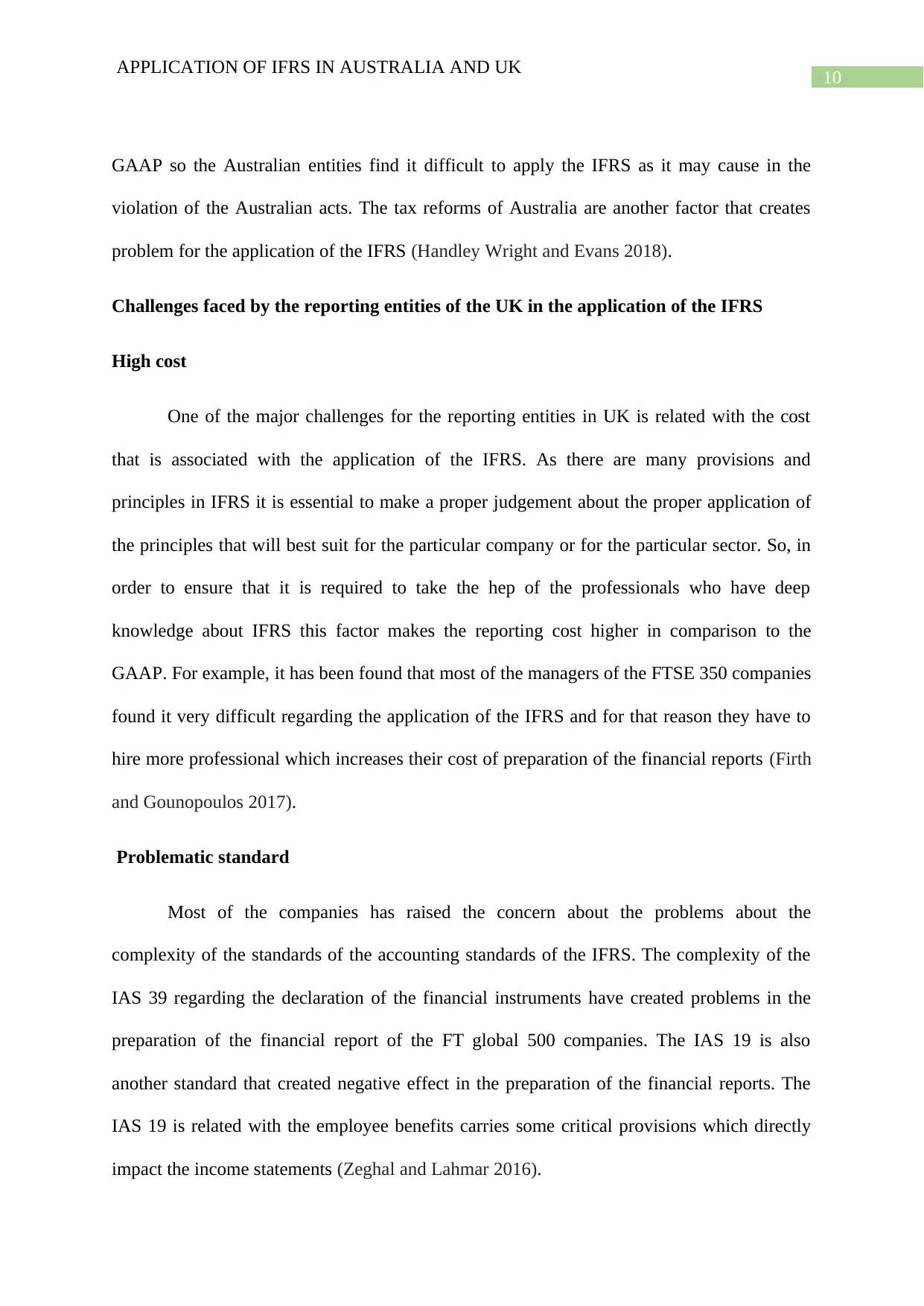
10
APPLICATION OF IFRS IN AUSTRALIA AND UK
GAAP so the Australian entities find it difficult to apply the IFRS as it may cause in the
violation of the Australian acts. The tax reforms of Australia are another factor that creates
problem for the application of the IFRS (Handley Wright and Evans 2018).
Challenges faced by the reporting entities of the UK in the application of the IFRS
High cost
One of the major challenges for the reporting entities in UK is related with the cost
that is associated with the application of the IFRS. As there are many provisions and
principles in IFRS it is essential to make a proper judgement about the proper application of
the principles that will best suit for the particular company or for the particular sector. So, in
order to ensure that it is required to take the hep of the professionals who have deep
knowledge about IFRS this factor makes the reporting cost higher in comparison to the
GAAP. For example, it has been found that most of the managers of the FTSE 350 companies
found it very difficult regarding the application of the IFRS and for that reason they have to
hire more professional which increases their cost of preparation of the financial reports (Firth
and Gounopoulos 2017).
Problematic standard
Most of the companies has raised the concern about the problems about the
complexity of the standards of the accounting standards of the IFRS. The complexity of the
IAS 39 regarding the declaration of the financial instruments have created problems in the
preparation of the financial report of the FT global 500 companies. The IAS 19 is also
another standard that created negative effect in the preparation of the financial reports. The
IAS 19 is related with the employee benefits carries some critical provisions which directly
impact the income statements (Zeghal and Lahmar 2016).
APPLICATION OF IFRS IN AUSTRALIA AND UK
GAAP so the Australian entities find it difficult to apply the IFRS as it may cause in the
violation of the Australian acts. The tax reforms of Australia are another factor that creates
problem for the application of the IFRS (Handley Wright and Evans 2018).
Challenges faced by the reporting entities of the UK in the application of the IFRS
High cost
One of the major challenges for the reporting entities in UK is related with the cost
that is associated with the application of the IFRS. As there are many provisions and
principles in IFRS it is essential to make a proper judgement about the proper application of
the principles that will best suit for the particular company or for the particular sector. So, in
order to ensure that it is required to take the hep of the professionals who have deep
knowledge about IFRS this factor makes the reporting cost higher in comparison to the
GAAP. For example, it has been found that most of the managers of the FTSE 350 companies
found it very difficult regarding the application of the IFRS and for that reason they have to
hire more professional which increases their cost of preparation of the financial reports (Firth
and Gounopoulos 2017).
Problematic standard
Most of the companies has raised the concern about the problems about the
complexity of the standards of the accounting standards of the IFRS. The complexity of the
IAS 39 regarding the declaration of the financial instruments have created problems in the
preparation of the financial report of the FT global 500 companies. The IAS 19 is also
another standard that created negative effect in the preparation of the financial reports. The
IAS 19 is related with the employee benefits carries some critical provisions which directly
impact the income statements (Zeghal and Lahmar 2016).
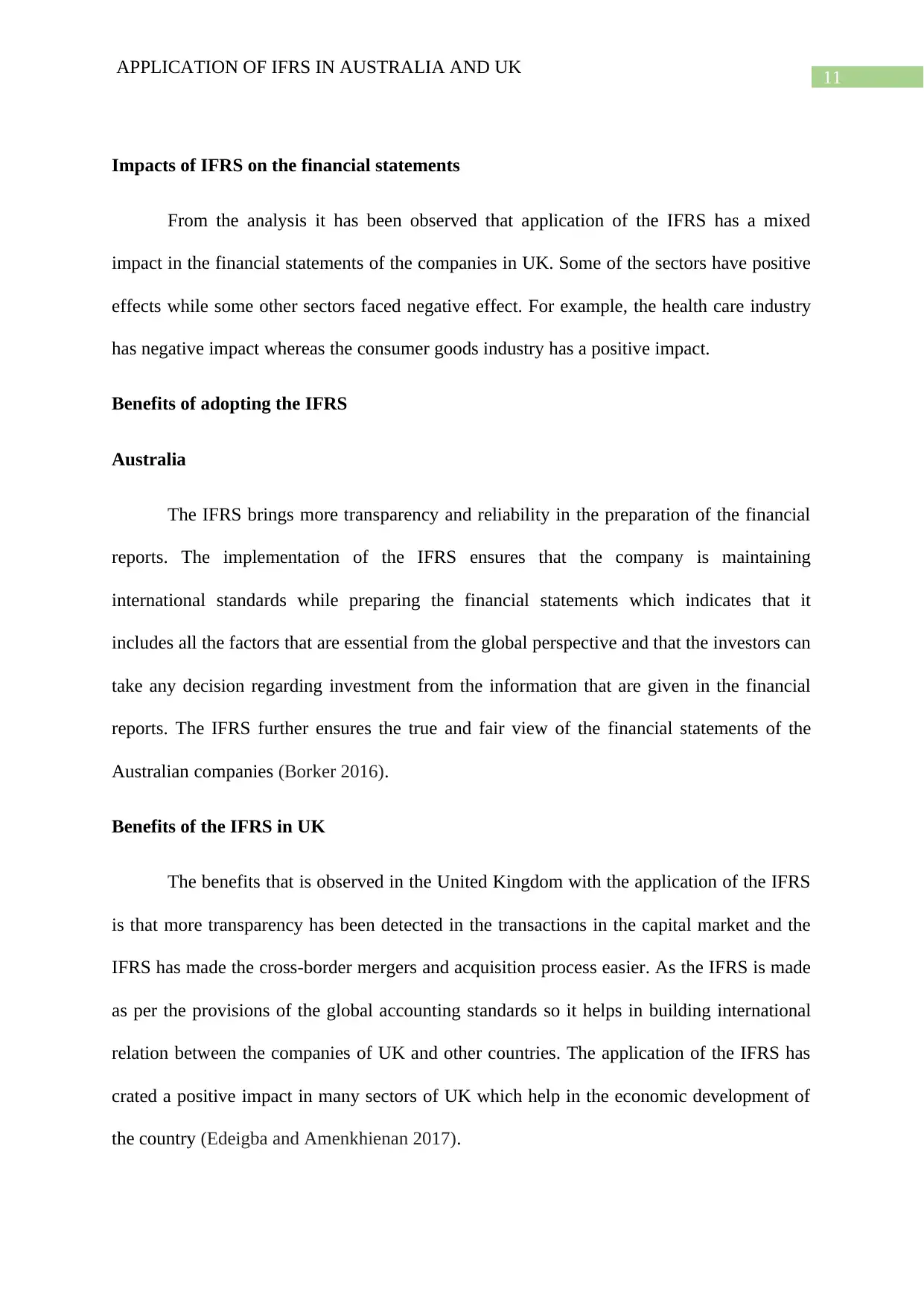
11
APPLICATION OF IFRS IN AUSTRALIA AND UK
Impacts of IFRS on the financial statements
From the analysis it has been observed that application of the IFRS has a mixed
impact in the financial statements of the companies in UK. Some of the sectors have positive
effects while some other sectors faced negative effect. For example, the health care industry
has negative impact whereas the consumer goods industry has a positive impact.
Benefits of adopting the IFRS
Australia
The IFRS brings more transparency and reliability in the preparation of the financial
reports. The implementation of the IFRS ensures that the company is maintaining
international standards while preparing the financial statements which indicates that it
includes all the factors that are essential from the global perspective and that the investors can
take any decision regarding investment from the information that are given in the financial
reports. The IFRS further ensures the true and fair view of the financial statements of the
Australian companies (Borker 2016).
Benefits of the IFRS in UK
The benefits that is observed in the United Kingdom with the application of the IFRS
is that more transparency has been detected in the transactions in the capital market and the
IFRS has made the cross-border mergers and acquisition process easier. As the IFRS is made
as per the provisions of the global accounting standards so it helps in building international
relation between the companies of UK and other countries. The application of the IFRS has
crated a positive impact in many sectors of UK which help in the economic development of
the country (Edeigba and Amenkhienan 2017).
APPLICATION OF IFRS IN AUSTRALIA AND UK
Impacts of IFRS on the financial statements
From the analysis it has been observed that application of the IFRS has a mixed
impact in the financial statements of the companies in UK. Some of the sectors have positive
effects while some other sectors faced negative effect. For example, the health care industry
has negative impact whereas the consumer goods industry has a positive impact.
Benefits of adopting the IFRS
Australia
The IFRS brings more transparency and reliability in the preparation of the financial
reports. The implementation of the IFRS ensures that the company is maintaining
international standards while preparing the financial statements which indicates that it
includes all the factors that are essential from the global perspective and that the investors can
take any decision regarding investment from the information that are given in the financial
reports. The IFRS further ensures the true and fair view of the financial statements of the
Australian companies (Borker 2016).
Benefits of the IFRS in UK
The benefits that is observed in the United Kingdom with the application of the IFRS
is that more transparency has been detected in the transactions in the capital market and the
IFRS has made the cross-border mergers and acquisition process easier. As the IFRS is made
as per the provisions of the global accounting standards so it helps in building international
relation between the companies of UK and other countries. The application of the IFRS has
crated a positive impact in many sectors of UK which help in the economic development of
the country (Edeigba and Amenkhienan 2017).
⊘ This is a preview!⊘
Do you want full access?
Subscribe today to unlock all pages.

Trusted by 1+ million students worldwide
1 out of 18
Related Documents
Your All-in-One AI-Powered Toolkit for Academic Success.
+13062052269
info@desklib.com
Available 24*7 on WhatsApp / Email
![[object Object]](/_next/static/media/star-bottom.7253800d.svg)
Unlock your academic potential
Copyright © 2020–2026 A2Z Services. All Rights Reserved. Developed and managed by ZUCOL.




